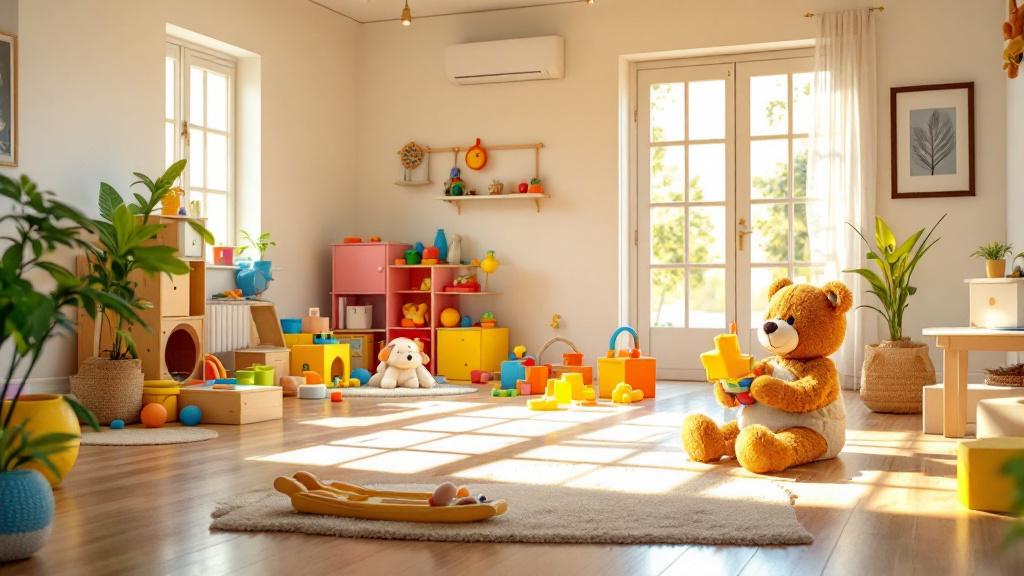The Integral Role of Play in Child Development and Therapy
Play is recognized universally as the primary occupation of childhood. It is through play that children develop a broad spectrum of skills essential for their growth, including motor coordination, social interaction, cognitive reasoning, and emotional regulation. Occupational therapy (OT) leverages this natural medium to facilitate developmental progress across various domains, making play a central strategy in therapeutic interventions tailored for children with diverse needs.
The Foundations of Play in Occupational Therapy

What is the role of occupational therapy in supporting play skills in children?
Occupational therapists play a vital role in helping children develop and strengthen their play abilities. They facilitate engagement in play activities tailored to each child's sensory preferences, motor skills, and social context. By adapting environments and tasks, OT supports children in reaching developmental milestones, promoting confidence and independence.
These professionals use various strategies, including creating fun and motivating activities that align with a child's interests. They also guide families on how to incorporate therapeutic play into everyday routines, making the process natural and effective.
Why is play important in child development and therapy outcomes?
Play is more than just entertainment; it is a fundamental activity for childhood development and therapeutic success. It stimulates children’s cognitive skills such as problem-solving, decision-making, and creativity.
Through play, children also develop social skills like sharing, turn-taking, and communicating effectively. Emotionally, play provides a safe space for children to express feelings, build resilience, and regulate emotions.
Physically, engaging in active play improves motor skills, strength, and coordination. The ongoing practice fostered by play translates into better performance in daily activities like dressing, feeding, and self-care.
Research confirms that play positively influences brain development, emotional health, and social integration, making it an essential component of pediatric occupational therapy.
How does play support independence in daily activities?
Play activities often mimic real-life tasks, helping children learn self-care routines like brushing teeth, dressing, and feeding themselves. For example, crafting activities enhance fine motor skills needed for writing or manipulating objects.
Group play fosters social competence and communication, which are crucial for school and community participation. Engaging in obstacle courses or ball games promotes gross motor skills essential for mobility.
Overall, play serves as a practical and enjoyable way to build the skills necessary for independence, confidence, and lifelong learning.
Strategies and Activities Used in Play-Based Occupational Therapy
 Occupational therapy leverages a variety of engaging play activities to foster development and independence in children. Crafts are often used to enhance fine motor skills, such as grasping small objects and improving hand-eye coordination. Cooking activities provide multi-sensory experiences and help develop motor, sensory, and cognitive skills, while themed activities based on children’s books stimulate language and imagination.
Occupational therapy leverages a variety of engaging play activities to foster development and independence in children. Crafts are often used to enhance fine motor skills, such as grasping small objects and improving hand-eye coordination. Cooking activities provide multi-sensory experiences and help develop motor, sensory, and cognitive skills, while themed activities based on children’s books stimulate language and imagination.
Materials and equipment play a vital role in therapy. Common items include balls, bubbles, recycled materials, and swings, each selected to target specific developmental areas. For example, balls and obstacle courses help improve gross motor skills like jumping, balancing, and coordination, while recycled materials and craft supplies support fine motor and sensory integration.
Play-based interventions in occupational therapy are activities that are enjoyable, purposeful, and child-centered. These incorporate drawing, climbing, swinging, and imaginative scenarios. They aim to motivate children to develop vital skills while having fun, making therapy effective and engaging.
OT practitioners also utilize storytelling and books to support skill development. Thematic play activities based on children’s literature help foster language growth, social understanding, and emotional regulation. Through stories, children explore emotions and social roles in a safe, playful environment.
Some examples of materials and their uses include:
| Material | Purpose | Examples of Activities |
|---|---|---|
| Balls & Bubbles | Gross motor, sensory input | Catching, popping bubbles, juggling |
| Recycled Materials | Fine motor, creativity, sensory processing | Building, collaging, exploring textures |
| Swings & Gym Mats | Vestibular system, balance, calming nervous system | Swinging, tumbling, obstacle courses |
Overall, play activities are tailored to meet individual needs while promoting physical, emotional, social, and cognitive growth. Occupational therapists use these strategies to support children in developing essential skills through fun, meaningful experiences.
Adapting Play to Support Different Developmental Challenges
What types of play are significant in pediatric occupational therapy?
In pediatric occupational therapy, different forms of play are crucial in fostering various aspects of a child's development. Sensory play helps children process tactile, auditory, and visual stimuli, aiding sensory integration and self-regulation. Constructive play, such as building with blocks or manipulating craft supplies, enhances fine motor skills and problem-solving. Pretend or symbolic play encourages imagination, language, and social-emotional skills, allowing children to explore roles and emotions. Social play, including group games and cooperative activities, promotes communication, sharing, and conflict resolution.
Children pass through developmental stages of play, starting with unoccupied and solitary play in infancy, moving towards parallel, associative, and eventually cooperative play in early childhood. Each stage builds on the previous, fostering increased social engagement, cognitive abilities, and independence. Therapists leverage these play types—employing activities such as media play, sensory activities, and fantasy scenarios—to support holistic growth, enhance emotional well-being, and help children meet developmental milestones.
Overall, understanding and incorporating various play modalities allow occupational therapists to tailor interventions that nurture a child's physical, cognitive, social, and emotional development, making play a central therapeutic tool.
How does play support therapy goals across different age groups?
Play remains integral to achieving therapy goals throughout childhood and adolescence by offering developmentally appropriate methods for growth. In preschoolers (ages 2-5), symbolic and imaginative play with dolls, puppets, or sensory activities helps children express feelings and develop trust. These activities also facilitate language development and emotional regulation. In middle childhood (ages 6-9), role-playing, storytelling, and structured games address social skills and self-esteem, cultivating resilience and adaptive coping strategies.
For older children and teenagers (ages 10-12+), play transforms into more complex activities like strategic games, art, or media-based play, which support stress management, trauma processing, and social connection. These pursuits help enhance emotional regulation, build peer relationships, and foster self-efficacy.
Across all ages, play-based therapy supports emotional expression, social competence, problem-solving, and resilience. Its adaptability makes it an effective approach for addressing diverse developmental needs, promoting not only skills acquisition but also overall well-being and confidence.
More Information Search Query: types of play in pediatric therapy and their benefits
This comprehensive understanding of play modalities enables occupational therapists to craft engaging, effective interventions tailored to each child's developmental level and specific challenges. When integrated thoughtfully, play serves as a natural, enjoyable pathway toward achieving therapeutic aims and supporting lifelong skills.
The Impact of Play on Brain Development and Lifelong Skills
Play is more than just fun; it is a vital activity that shapes the brain and develops essential skills across a person’s lifespan.
Scientific research offers compelling evidence that play supports brain growth by stimulating neural circuits involved in cognition, emotional regulation, and social skills. Studies on animals and imaging research in humans show that engaging in diverse play activities promotes brain plasticity, helping in the development of pathways that influence learning, memory, and emotional health.
Active outdoor play and sensory activities are particularly influential in motor and cognitive development. Outdoor play involves physical challenges like climbing and running, which enhance motor skills such as balance, coordination, and strength. Sensory play—such as finger painting or exploring textured materials—improves sensory processing, allowing children to better interpret and respond to their environment.
Play also fosters resilience, self-regulation, and emotional well-being. Through play, children learn to manage their emotions, develop coping strategies, and build confidence by overcoming challenges in a safe setting. Imaginative scenarios and social games teach problem-solving, sharing, and negotiation, which are crucial for social integration.
Occupational therapy leverages the power of play to support development in children with diverse needs. By integrating age-appropriate play activities, OT helps improve motor skills, sensory integration, social interaction, and emotional resilience. These benefits extend into lifelong skills that promote independence, mental health, and well-being.
In sum, play is a foundational activity that enhances brain development, supports physical growth, and nurtures resilience and emotional health. Recognizing and promoting meaningful play experiences is essential not only for children’s current development but also for their lifelong success and happiness.
Embracing Play as a Lifelong Occupational Foundation
Recognizing play as a fundamental human occupation, occupational therapists advocate for its importance across the lifespan, emphasizing its role in fostering health, well-being, and resilience. Through tailored, engaging, and developmentally appropriate play interventions, therapy not only supports children in achieving critical developmental milestones but also instills a love for learning, adaptability, and social participation. Promoting play as a right and a powerful tool for growth underscores the essential philosophy of occupational therapy—empowering individuals to lead fulfilling, independent lives through meaningful activity.
References
- Occupational Therapy Play - The OT Toolbox
- Play-Based Occupational Therapy - Cross Country Healthcare
- Play as Occupation: The State of Our Science and a Research ...
- The Role of Play in Occupational Therapy: Building Skills Through Fun
- Play in Occupational Therapy for Children and Adults
- "The Power of Play: Unveiling the Occupational Therapy Magic for ...
- Child-led play-based therapy - Ability Innovations
- Play in Occupational Therapy











